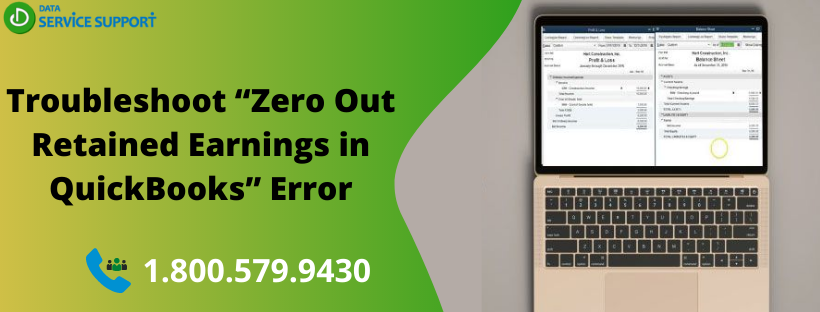Retained earnings in QuickBooks is an equity account that accommodates the year-end balance of your business. At the end of the year, QuickBooks automatically add the previous year’s net income into your current year balance sheet as retained earnings. It is important to zero out retained earnings in QuickBooks so that you can start with the new fiscal year with a zero-net income. In this post, we will discuss how to zero out retained earnings in QuickBooks application.
If you are now sure how to close out retained earnings in QuickBooks, give us a call on our helpline number 1.800.579.9430 and get in touch with the qualified QB experts now
How to Zero Out Retained Earnings in QuickBooks?
There is no particular procedure to zero out retained earnings in QuickBooks. Retained earnings denote the past earning of your business. At the end of your financial year, you will have some profit balance retained. QuickBooks directly transfers these retained earnings to the next year’s balance sheet as retained earnings account. If you have zeroed out retained earnings in QuickBooks, it means you have entered an incorrect amount in the income statement. To fix it, you need to review the financial report of your firm.
Check your expense account if you have QuickBooks retained earnings incorrect:
- Launch QuickBooks application and move to the Chart of Accounts.
- Now locate the Income Summary. If you are not able to locate this option, then you need to add Expense Account.
- In the same manner, you have to add the owner’s equity account as Retained Earning account.
- After that, move to profit & loss account report or Income statement.
- Filter your P&L account as a fiscal period to proceed further.
- Next, review all revenue and expense account.
- Now go to the New Journal EntryWindow to create new journal entries. Enter the date for the last day of the account closing date.
- Again, from within the P&L account, you need to select all revenues and all the debit amounts.
- In the last line of the entry, you need to select the income summary account that you have created. Credit the total of all the revenue accounts.
- Hit Save and Close to finish.
Important: In this procedure, you need to ensure that all the numbers are entered correctly. If not, you need to fix them to resolve the zero out retained earnings in QuickBooks application.
How to Adjust Retained Earnings in QuickBooks?
With the occurrence of a new closing date, your retained earnings will be updated automatically. You can also adjust your retained earnings in QuickBooks by following the below-given steps:
- Launch QuickBooks application and then click on the Edit from the Menu bar.
- Next, you must select Preferences and select Accounting option to proceed further.
- Now select date/ password from the Company Preferences.
- When you are done, define the closing date and password, and when the next box opens, confirm the changes you have made.
These steps can help you adjust QuickBooks retained earnings closing entry and fix “zero out retained earnings in QuickBooks” issue.
How to Handle the Closing Income Summary?
To manage your closing income summary, you need to create a new journal entry that has a date immediately before the last closing period. Now you need to credit or debit the Net Income amount in the income summary account according to your profit or loss. Next, you need to select the retained earning account and perform the credit or debit and click Save and Close to finish.
Read More: QuickBooks Crashes while Exporting Reports To Excel (Fixed)
Need Help?
Reading this post can help you if your QuickBooks retained earnings closing entry becomes zero. If you need further assistance from the qualified QuickBooks experts, give us a call on our helpline number 1.800.579.9430. In no time, you will be connected with one of our dedicated QB experts, who will guide you with “zero out retained earnings in QuickBooks” issue.
